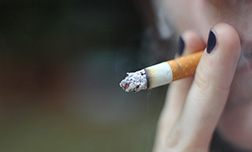Current and Former Smokers May Have Lower Chance of Getting Pregnant, Study Finds.
Women have a lower chance of getting pregnant in their first year trying to conceive if they have a history of heavy, prolonged smoking, according to a study co-authored by BUSPH researchers.

Teams from BUSPH and Aarhus University Hospital in Denmark compared the chance of getting pregnant among 686 current smokers, 741 former smokers, and 2,346 never smokers from a study of women in Denmark who were attempting pregnancy.
The study, published online by the journal Fertility and Sterility, is the first to analyze former smokers according to how many cigarettes they smoked per day and for how long. Previous studies, which grouped all former smokers together, did not find any difference in pregnancy rates between former and never smokers.
“Pregnant women are already encouraged to quit smoking because of the risks to the mother and baby. Some women might not be aware that current regular smoking also harms female fertility, as concluded by the U.S. Surgeon General based on observational studies and animal studies,” said Rose Radin, a doctoral student in the BUSPH Department of Epidemiology and the lead author of the study. “Our study also found that current regular smokers take longer to get pregnant than never smokers.”
Among the former smokers with the highest level of exposure, the chance of getting pregnant was reduced on average by 26% per menstrual cycle. The highest level of exposure was 10 or more pack-years, a measure that quantifies the lifetime intensity and duration of smoking. One pack-year is equal to smoking 20 cigarettes (one pack) per day for one year. Former smokers who smoked less than 10 pack-years had a similar chance of getting pregnant as never smokers. The researchers adjusted for other explanatory factors such as age.
“Our results would need to be replicated by other researchers before we can consider whether there truly is a persistent effect of smoking on female fertility,” Radin said. “There is some biological evidence to support the theory. Animal studies have found that high exposure to tobacco smoke reduces the permanent store of oocytes, impairs function of the fallopian tubes, and may increase susceptibility to infection.”
The researchers also examined whether passive smoking by never smokers was associated with a lower chance of getting pregnant, and they found that it was not.
BUSPH co-authors on the study were Elizabeth Hatch, a professor of epidemiology; Kenneth Rothman, a professor of epidemiology; and Lauren Wise, an associate professor of epidemiology. Collaborators from Aarhus University Hospital were Ellen M. Mikkelsen, Henrik Toft Sørensen, and Anders H. Riis.